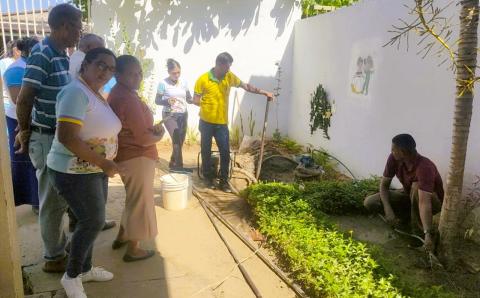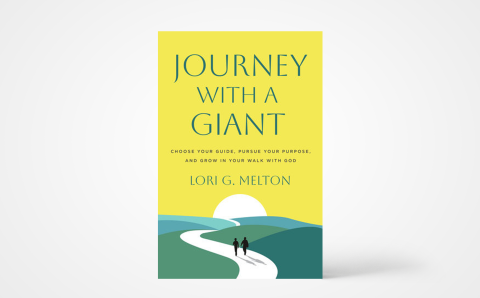In September Ivanrest Christian Reformed Church in Grandville, Mich., piloted a Biblically Faithful, Courageously Loving workshop to equip its council members to lead in a “posture of radical hospitality” within biblically faithful guidelines in terms of human sexuality.
“Our congregation has a real heart for living into the pastoral piece of care towards LGBTQ people—how can we be radically hospitable and welcoming to people while calling them to live in line with our biblical convictions?” said Ivanrest pastor Brandon Haan.
Haan said following Synod 2022 when the CRC’s general assembly reaffirmed its position, first specifically articulated in 1973, that same-sex sexual relationships are incompatible with obedience to the will of God as revealed in Scripture, his congregation hosted several “listening circles” to work through the material of the human sexuality report. He said two key pieces of feedback came from those discussions: the church needed more instruction on how to live into these convictions well, and the church’s leaders—deacons and elders—needed to be equipped to lead from a loving posture. “We had the position—what we believe,” said Haan. “We needed help with how to lovingly live that out.”
A similar need was expressed in Classis Alberta North (a regional group of CRC churches) where pastor Lisa Vander Leek was serving on the classis interim committee. “In a classis meeting in the fall of 2023, one of the churches from Classis Alberta North had on their credentials a question asking classis to investigate how we can better care for our LGBTQ2S+ members,” and those who aren’t members, Vander Leek said. They proposed starting a cohort, similar to one that had run in Classis Toronto, to learn together.
At the March 2024 Alberta North classis meeting a steering team of three presented the cohort proposal, and classis encouraged churches to participate. They received funding from Thrive through its Thriving Practices cohort program, an initiative made possible through a Thriving Congregations grant, originally received in 2020, and just expanded. Eight churches and one unofficial participant from a ninth congregation got started in January 2025, and they expect to conclude in February with a report to classis in March.
“Each church was asked to develop a team that would be their cohort team—some churches had two or three people, some had more—and that group would attend our three large group sessions and then also engage in monthly coaching,” Vander Leek said. Groups were expected to develop at least two projects or “experiments” as Vander Leek called them “of ways in which they could increase hospitality in their community, and then learn from them, and share that with the larger group context.”
The large group sessions included a theology of hospitality, a video presentation and discussion of Exiles in Babylon conference recordings “from some speakers about their experience of being LGBTQ2S+ in the church,” and “more learning about growing in faith and creating a discipleship environment for people,” Vander Leek said.
What does it mean to be hospitable?
Ron DeVries, who pastors Covenant CRC in Edmonton, Alta., and is a former regional connector with Thrive, was one of the cohort coaches with Vander Leek. He found “the language around ‘hospitality’ was something, and is something, that we continue to navigate through. What does that really mean, and what does that look like? The entry point was ‘how do we walk alongside those who identify as LGBTQ2S+,’ but what we really wanted to lean into was ‘what does it mean to be hospitable in general’ within the entire body (of Christ) and throughout our ministries.”
“Digging more into the theology of hospitality was good to get more of the scriptural foundation for it,” Vander Leek said. “It doesn’t mean that everything goes, but it may mean that you have to create more space than what you were comfortable with before. … And sometimes what you think is hospitable actually isn’t, so having those conversations with churches as a cohort, to wrestle through some of that has been really, really good.”
At Ivanrest, about 40 people attended the Sept 13, 2025, workshop with presenters David Beelen, a retired CRC pastor who served Madison Square Church in Grand Rapids, and Laurie Kreig, an author and speaker with a calling to bridge the gap between LGBTQ+ people and the church. Haan said when the Ivanrest council first looked at providing this for its own officebearers they noticed other congregations in Classis Grandville also expressing a need. A new ministry fund that Ivanrest had set aside and not used since before the COVID pandemic made them able to offer “Biblically Faithful, Courageously Loving” as a gift to the classis.
“A main goal of the council when they asked for this was to care for people pastorally and compassionately, to relate to LGBTQ people in our congregation and in their families,” Haan said.
He said Beelen and Krieg covered both broad concepts about how churches can approach marriage and family and singleness, with an eye to people coming from a range of perspectives, and really practical things to signal welcome, like not using outdated terminology, so a person’s “experience of church is livable.”
The workshop was scheduled right at the end of a summer sermon series that explored the varied topics of the human sexuality report over eight weeks. Haan said the workshop's material would likely not be new to someone deeply immersed in the content of the human sexuality report and related materials over the years that pastoral care to LGBTQ+ people has been front of mind in the CRC, but he got the sense that looking deeply at church culture around family and how people are welcomed was “new for a lot of other people who haven’t been consumed by these topics.”
Carrying it forward
After receiving what Haan said was unanimous feedback that the workshop was helpful, and hearing from other local churches that they could benefit from something like this too, Ivanrest CRC is remounting the Biblically Faithful, Courageously Loving workshop in the spring, opening it beyond their classis to anyone who would like to attend in the greater Grand Rapids area on April 18.
In Alberta, Vander Leek said she hopes the report and the work of the cohort will encourage other churches to also stretch toward hospitality and to understand that this learning was “meant to help us put the principals in the human sexuality report into practice, and to acknowledge the ways in which we, as churches, have not cared well for our LGBTQ2S+ members, and have sometimes used position, especially the confessional status position, as a way of ignoring or not ministering to LGBTQ2S+persons.”
“My hope in the end is that because we've done some of this work, and some churches have spent a lot of time thinking through what hospitality looks like and feels like, that their own hospitality will be expanded, not just toward LGBTQ2S+ persons, but to everyone in general, and that some of those wrestling questions will expand throughout their church's ministry and discipleship needs,” Vander Leek said.
And “for those churches that didn't participate or weren't able to participate, that it will push them to think about some of these hard questions, and not just think that because they've come to a confessional position on something, that it means that their job is done.”
About the Author
Alissa Vernon is the news editor for The Banner.









